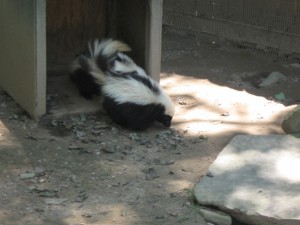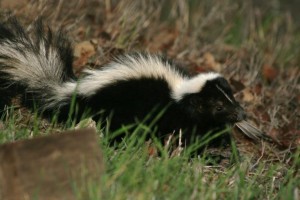 Now that we’re well into summer, you’ve probably smelled that familiar musky odor that can only be a skunk more than a few times. While skunks are a commonly known critter, there are still many myths about them. Since this is the time of year for increased skunk activity, it’s a perfect opportunity to dispel some myths about our smelly friends.
Now that we’re well into summer, you’ve probably smelled that familiar musky odor that can only be a skunk more than a few times. While skunks are a commonly known critter, there are still many myths about them. Since this is the time of year for increased skunk activity, it’s a perfect opportunity to dispel some myths about our smelly friends.
Common Skunk Myths
- Tomato juice will remove the smell of skunk spray.
We’ve all heard this one. In fact, you probably know someone who has bathed themselves or their pet in tomato after an unintended encounter with a skunk. Unfortunately, bathing in tomato juice will only make you smell like, well, tomato juice. And once the tomato juice smell goes away, you’ll be back to smelling like a skunk. See, a skunk smell is so strong your nose actually gets used to it by binding your smell receptors. This phenomenon is called olfactory fatigue.
- Skunks will spray you if you get too close.
Skunks only spray when they feel threatened or are frightened. It is their natural defense against predators and that’s what they use it for. If you find yourself close to a skunk avoid making rapid or quick movements or shouting. Dogs usually only get sprayed when they start jumping toward the skunk and/or bark. Simply walk away slowly and you should be just fine.
- Since skunks are nocturnal, they only come out at night.
Skunks are indeed nocturnal, but that does not mean they only come out at night. Some come out during the day to search for food if a predator has been preventing them from venturing out at night or a mother has been tending to her young.
- Fox urine is a skunk repellant.
Sorry to disappoint, but fox urine will not repel a skunk. The conventional wisdom was, if you spread fox urine the skunk would smell it and be frightened away since the fox is a natural predator. If skunks always ran away from fox urine, they wouldn’t have too many places to go in the wild.
As soon as you suspect you may have a skunk infestation, call us immediately at 847-464-1861 for removal. We are trained professionals and equipped to deal with wild animals.




